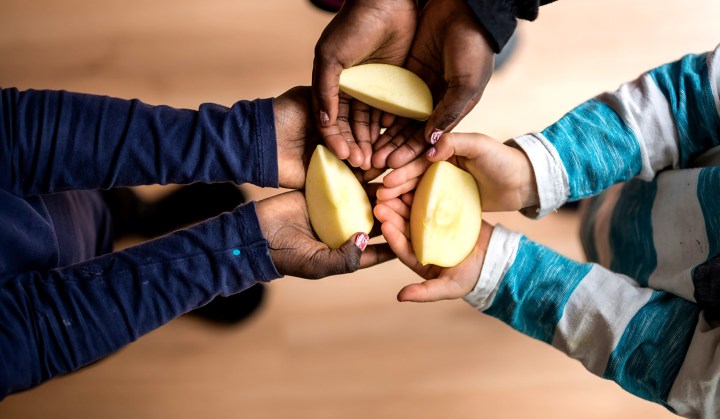
RIGHT TO EAT
Civil society must ensure government meets obligation to ensure no child goes hungry

Government must ensure stronger food regulation, ensure food subsidies and regulate prices so everyone can afford to eat, say food activists.
Food Security South Africa hosted an online imbizo on Tuesday, “Realising the right to food in South Africa: Has the pandemic moved us forward?” which brought together academics and food rights activists.
“We need to be mobilising people around the concept of the right to food,” said Dr Marc Wegerif, senior lecturer and development studies programme coordinator at the University of Pretoria.
“What is as important as any clever litigation is if we can promote this sense amongst people that we really do have the right to food, because that sense would be the basis for litigation.”
Wegerif said the Treatment Action Campaign was a good example of how social mobilisation around a right (access to health) was used as the basis for successful litigation, and that the organisation had set a litigation precedent.
He did, however, caution that when it came to strategic litigation, one needed to pick cases carefully and ensure they would be “winnable” — where you can make the argument of the state’s obligation to ensure the right to food, particularly for vulnerable populations such as children.
According to Wegerif, a hallmark of effective mobilisation is clear and simple messaging that people understand and can rally behind.
“I would love to see parents demanding good and healthy food for children in schools… not just ‘food’,” said Wegerif.
Pointing to the Equal Education litigation case for learners’ right to receive food from the National School Nutrition Programme (NSNP), he said this was a good example of what could be achieved by using the law to mobilise around the right to food.
Aisosa Omoruyi, post-doctoral researcher at the Dullah Omar Institute, agreed that the NSNP case could be used as a catalyst for further mobilisation for the right to food, but also pointed out that class action suits such as the one against Tiger Brands regarding the listeriosis outbreak could also be a point of mobilisation for the right to food.
Founder of the Children’s Resource Centre, Marcus Solomon, said that when the organisation began 30 years ago, the aim was to build a movement of children which started with food gardens and food sovereignty as one of their programmatic areas. The idea was that children should become active participants in the movement for the right to food, he explained.
Solomon highlighted that litigation, while a good tool, had limitations. “If you don’t have mass support, it’s not going to really work.”
He said the fact that food prices kept increasing showed how “the food industry is running amok with the health and lives of our people”.
SECTION27 legal researcher, Baone Twala, said that inasmuch as litigation could be useful, it could also be difficult and time-consuming. However, a child’s right to basic nutrition was unqualified, meaning that the government had an obligation to ensure immediate fulfilment of this right.
Twala said it was also the government’s obligation to step in and provide access to food where parents were unable to do so, as evidenced by the NSNP case.
“Realising the right to food needs a strong and unified voice,” said Nzama Mbalati, programmes manager at Heala, a coalition of civil society organisations. He pointed out that there were practical ways to hold the government and food industry accountable, such as the health promotion levy, colloquially known as the sugar tax.
“Government has to ensure stronger food regulation and must ensure food subsidies and regulate prices of food so everyone can afford to eat.
“We have the Constitution as a mechanism to realise the right to food and have established a coalition of social justice movements, along with the faith sector, to realise food justice,” Mbalati said.
Charles Simane, a researcher at the South African Food Sovereignty Campaign, said that people needed seeds to grow their own food and that there was a need to build localised food systems. This meant challenging the global food system and re-orienting food production away from export and towards production for local consumption.
Simane also highlighted the need to “collapse patriarchal and capitalist systems that leave women out of food production”, saying that challenging capitalism itself could not be realised through “state welfarism” such as grants. DM/MC




















 Become an Insider
Become an Insider
Comments - Please login in order to comment.